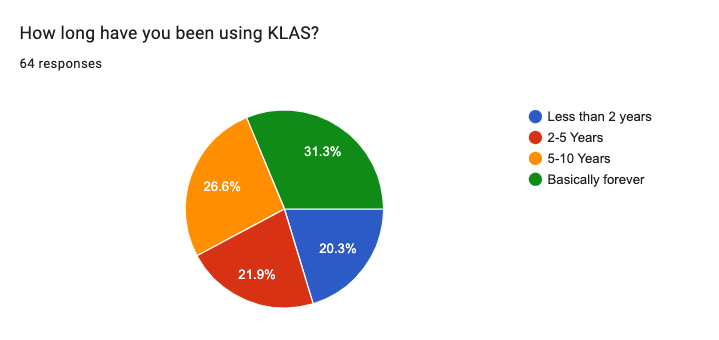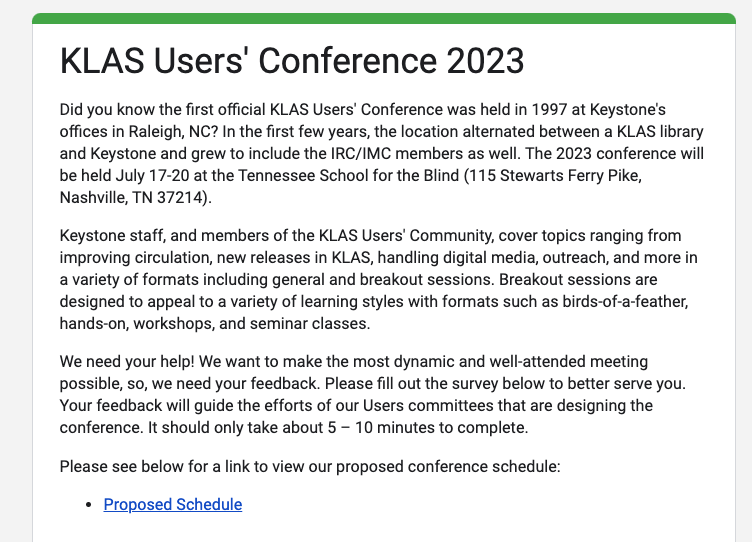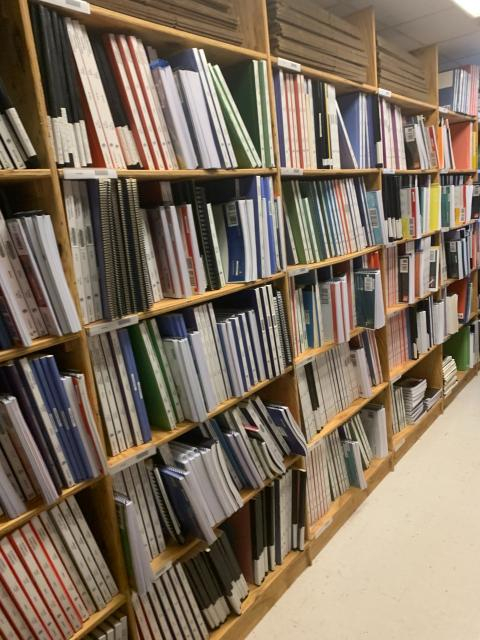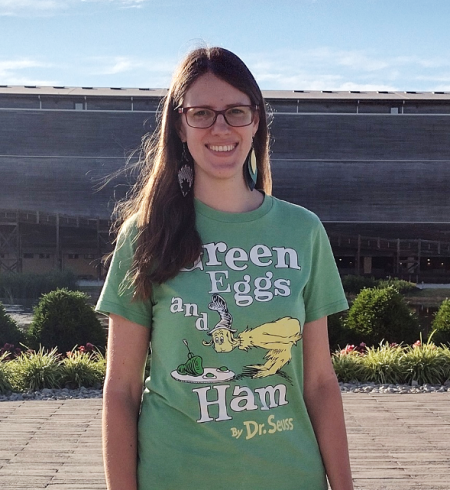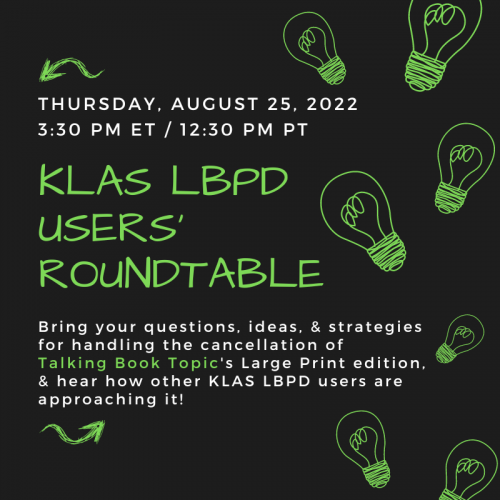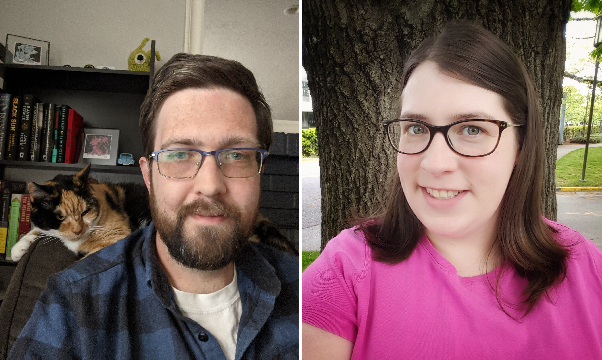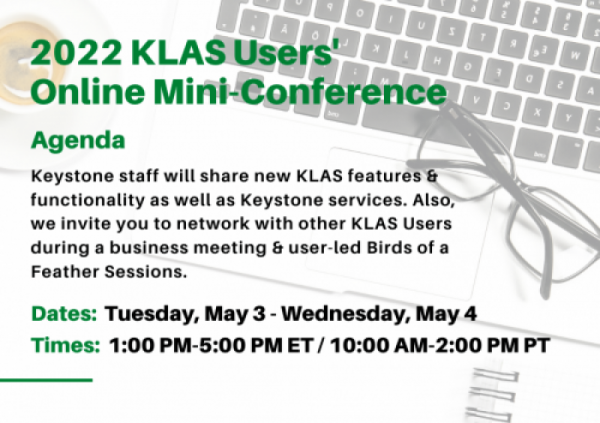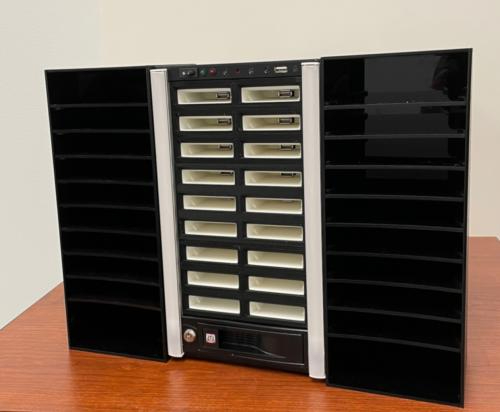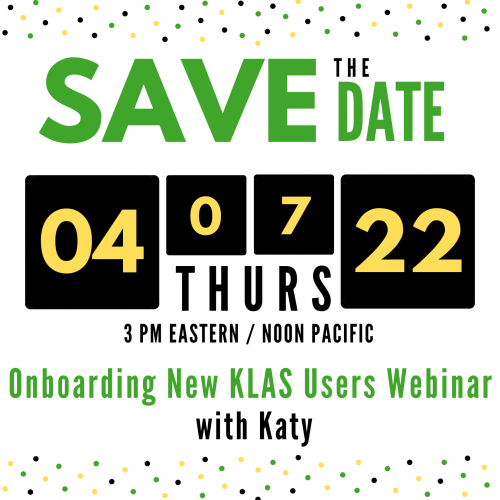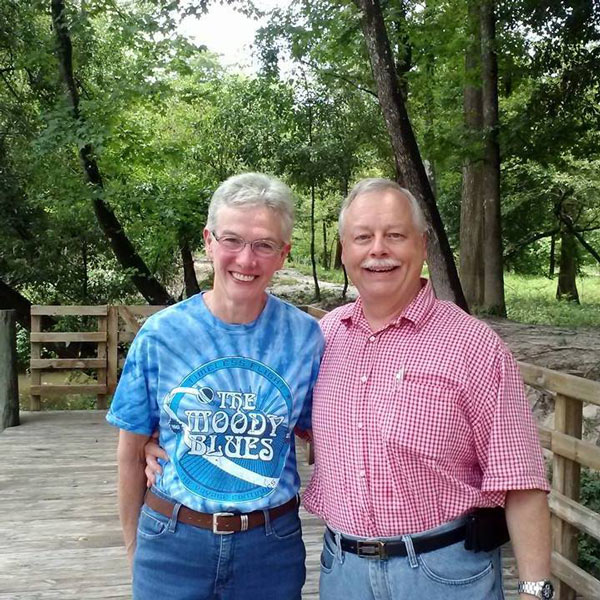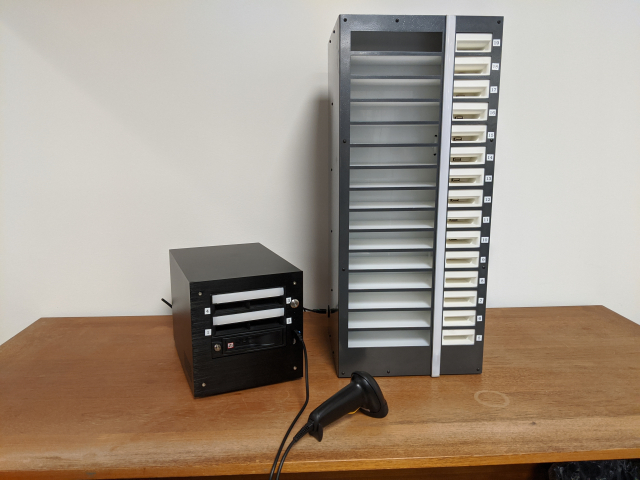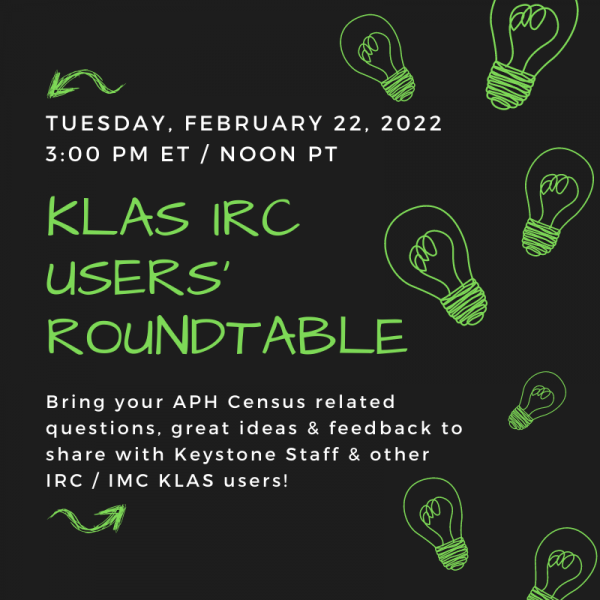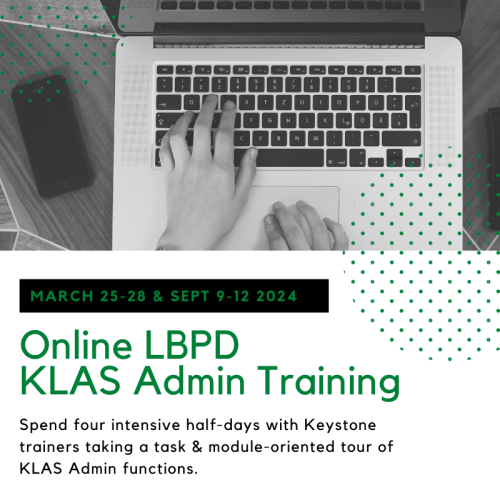- Katy Patrick
- News
Hello KLAS users,
Please note that KLAS does not yet officially support Windows 11. While we have had users running successfully on version 21H2, we now have reports from users running Windows 11 version 22H2 that it is not compatible with KLAS. This version is newly released and in the initial stages of roll out.
We are working to identify and resolve the issue, but it may take some time.
If at all possible, please do not upgrade to Windows 11 version 22H2.
We will let you know once we have solved the compatibility issues and Windows 11 is fully supported with KLAS.
KDAC Update & Thank You
Expired- Andrea Ewing Callicutt
- News
From Sam Lundberg, President, KLAS Development Advisory Committee:
It’s been a few months now since the KLAS User Experience Survey circulated, and the KLAS Development Advisory Committee (KDAC) has spent the time pouring over all the answers we received. Some of you had small, actionable requests that will hopefully be coming down the pipeline soon. Others had big ideas that, rather than being added now, will help inform the next major iteration of KLAS. Finally, are my personal favorite suggestions: small quality-of-life fixes that make each day that 1% easier.
I can’t say exactly what will be coming next or which features will make it to live. We certainly had some common threads around the Service Queue, updating catalog records, the WebOPAC, and tools to handle Has-Had titles. The changes that DoD makes for patron service are starting to become clear and more feedback on how to mechanically address those changes will be vital. I believe there will also be some training coming to discuss requested features that are actually already part of KLAS, if not always obvious.
The survey was anonymous, so I can’t get into the details of the responses. But I can share some interesting demographics data we gathered. Nearly ⅓ of responses came from users with more than 10 years experience with KLAS. Only 14% of responders use hotkeys constantly within KLAS, while 30% use them occasionally and 29% never use them at all.* The klasusers,com discussion forum is still under-appreciated with only 33% of responders saying they use it to interact with the KLAS community, but almost 70% attend the KLAS Conference, webinars, and/or the listserv. Reviewing anonymous survey responses proved tricky because we found many suggestions we wish had more detail or clarification, but that’s the tradeoff for honest feedback on what’s wrong now as well as what we want in the future.
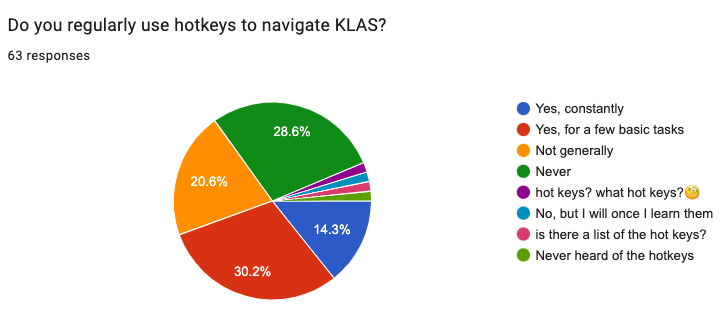
Of course, the conversation doesn’t end with the survey. Keystone and KDAC are always looking at the forum, the listserv, the various live training sessions and presentations (organized or organic), and all other ways users talk to one another. Also, we invite you to speak with any KDAC officer directly about anything you’d like us to put forward. Development is an ongoing conversation about what would be good to add, but also about priorities and allocation of resources. Even if you know something you want is in the works or on the table, be sure to also let us know the importance of that change or feature to you or your library so it can get that extra oomph behind it.
Finally, because I haven’t said it yet in this letter, thank you all for your participation in the survey specifically and the broad mission of KLAS Development generally!
*Note from Katy: If you are among those who don't know what they Keyboard commands are or who need a list to help you become more familiar with them, check out the KLAS Keyboard Shortcut page for a reference.
- Katy Patrick
- News
Are you looking forward to the next in-person KLAS conference? Or would you prefer to keep things online? Either way, I have some hopeful news: planning for the 2023 KLAS Users’ Conference is underway and picking up steam!
Barring still more “unprecedented events,” UC 2023 will be held July 17-20, 2023 at the Tennessee School for the Blind in Nashville, TN. For those who can’t attend in person, we are looking into options for hybrid sessions, and plan to offer as much of the conference to you as possible. To facilitate this, we will likely be changing up the conference schedule, allowing in-person-only, hands-on content to occur in the mornings, and hybrid sessions to occur in the afternoon (when they will be reasonably timed across more time zones). Our goal is to ensure those attending in person get as much value for their travel as possible and provide a valuable experience for those who can’t join us in Tennessee, while ensuring both groups will be able to justify the expense to their funding agency.
While we do not yet know what the registration fees will be, we will try to keep them as low as possible and still deliver a quality conference. Our top contender for the conference hotel has quoted us a nightly rate of $179 / night, which is below the 2022 government rate. We are researching transportation options to get everyone from the hotel to the school and back, and catered-in lunches will help keep daily meal costs reasonable. For online attendees, a minimal registration fee will help cover whatever equipment or software costs we incur to bring the afternoon sessions to you.
Helping us to close in on the specifics, we just completed a site visit, checking out what has changed at TSB since 2019, investigating possible reception venues and caterers, and making sure the hotel is up to par.
We have excellent Programming and Logistics Committees assembled who are digging into all the challenges of our first hybrid conference, as well as all the usual conference minutiae, but of course we need your help as well. How many people should we expect in-person or online? What precautions need to be in place to ensure everyone’s health and safety?
Have a look at our proposed conference schedule, read on for a few teasers from our site visit, but also don’t miss completing our Pre-conference Planning Survey. With so much uncertainty, change, and opportunity for an amazing new conference format, we need your input this year more than ever!
Site visit photos:

Allen Huang, Director of the Tennessee Instructional Resource Center, shows us the school's atrium, which is excellent for general sessions with its comfortable chairs, large projection screen, and monitors set up to mirror the front screen.
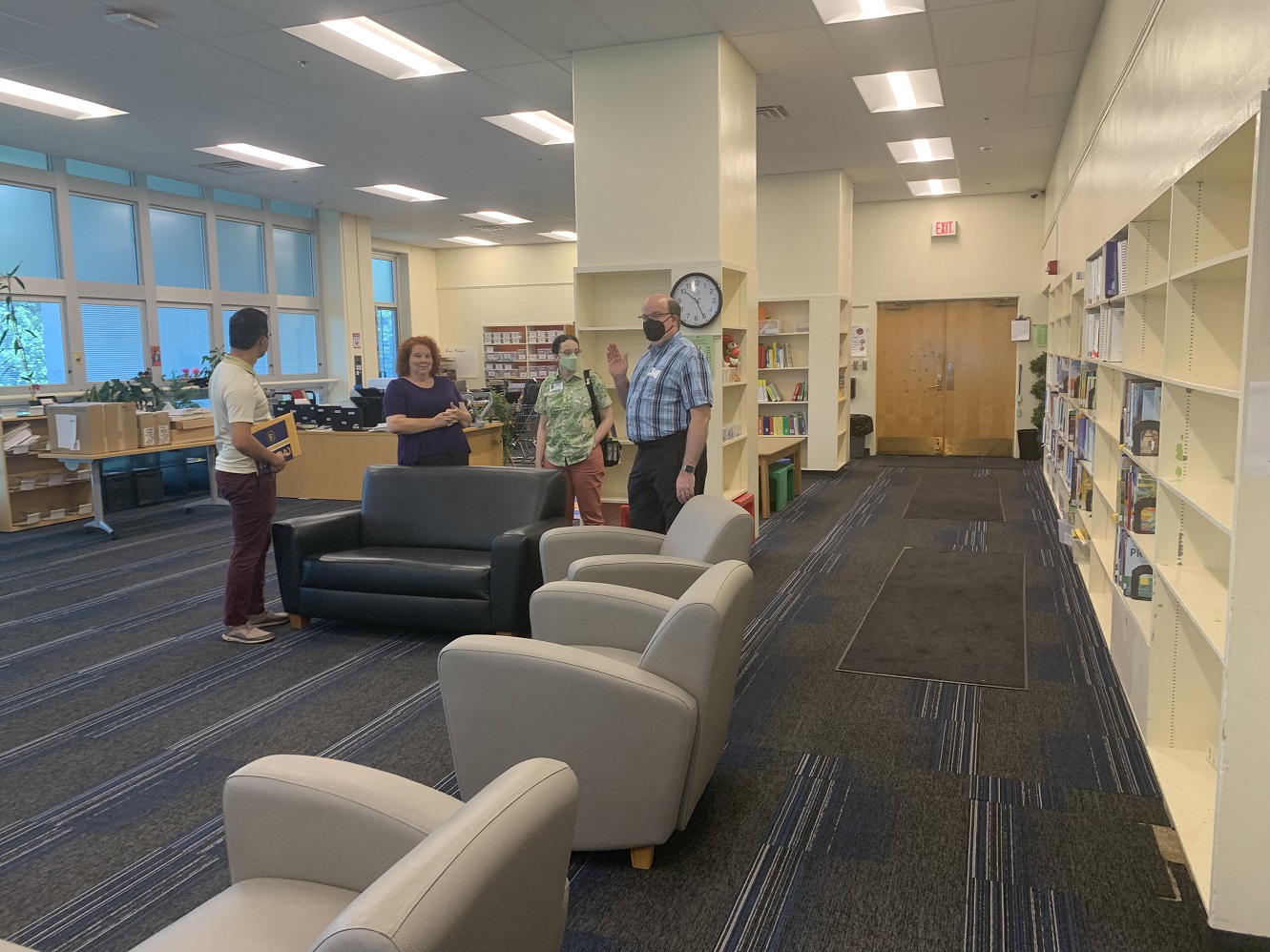
The school librarian shows Keystone staff Katy and James their conversation area, which is a good fit for casual networking or just decompressing between conference sessions.
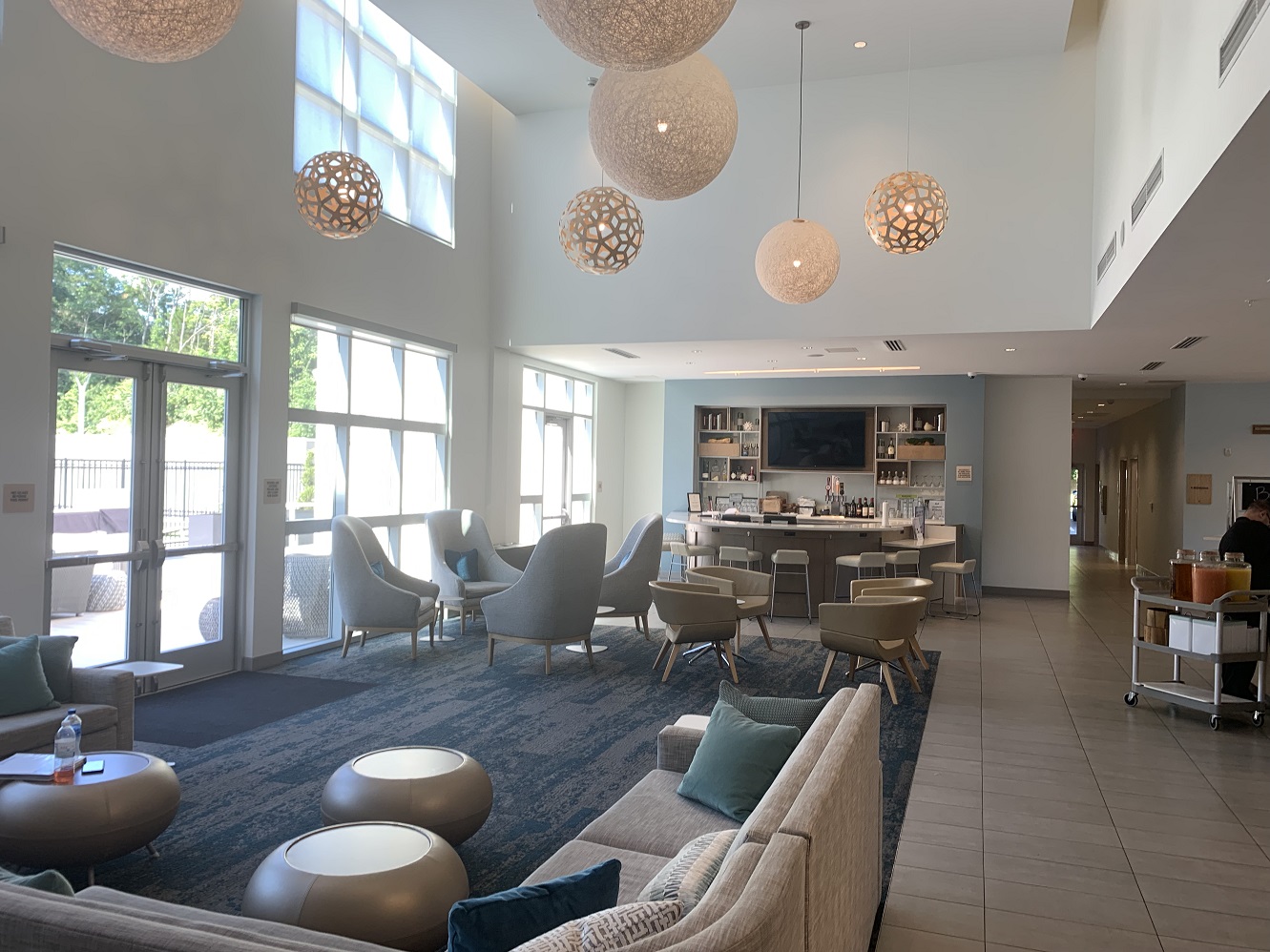
The hotel has plenty of hang-out space split between the interior lobby and the outdoor courtyard. The pool will be a welcome amenity come July, and there is an indoor gym, hot breakfast, all-day coffee, and a bar. There are a couple restaurants and convenience stores within walking distance, or biking distance on one of the hotel's bicycles.
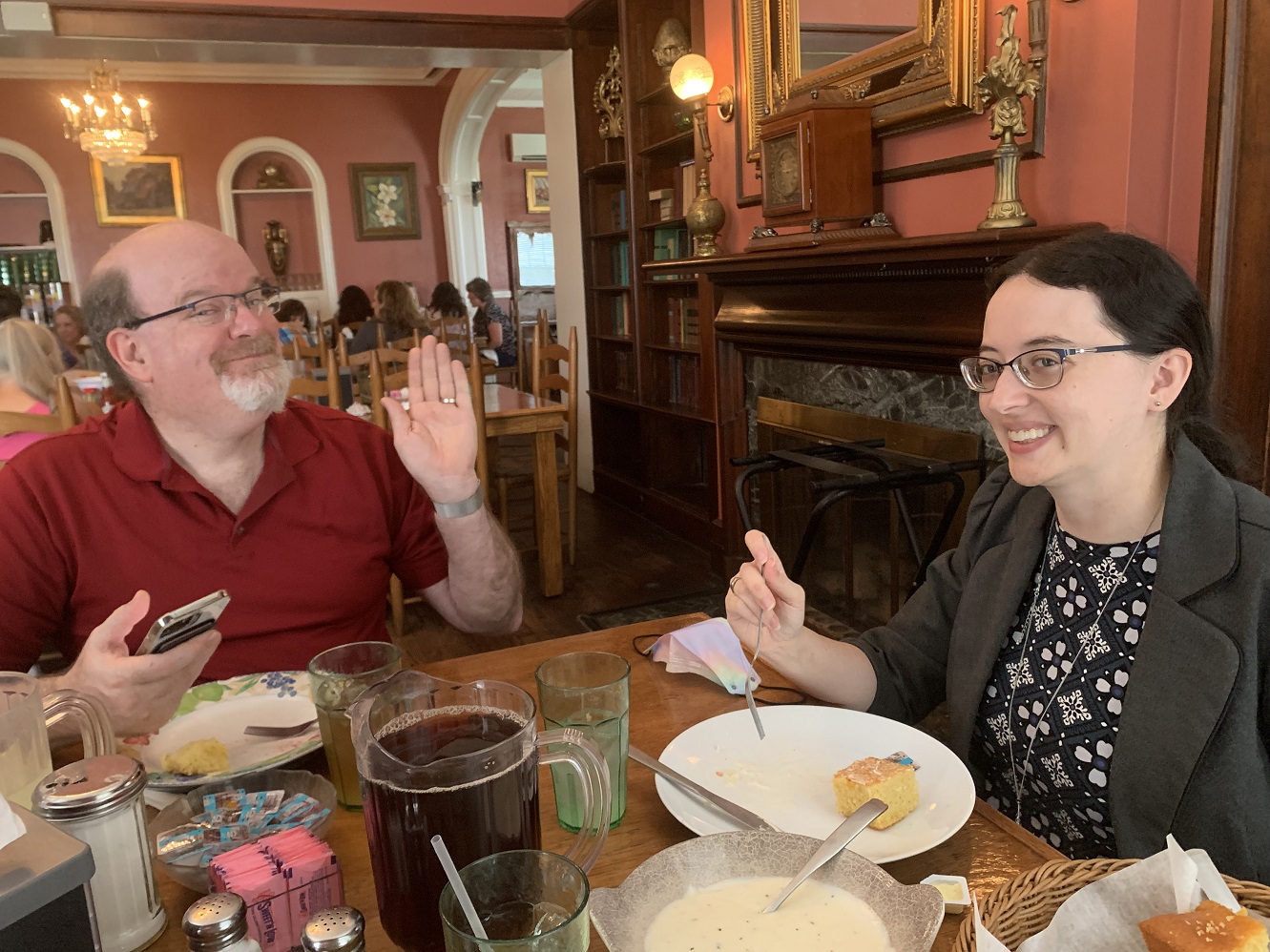
James and Katy trying out the food at a possible reception venue, Monell's at the Manor, which is a family-style restaurant in a historic mansion. If we move forward with this venue, we would have exclusive access--only Users' Conference attendees and restaurant staff would be present, and there is a ton of room to spread out and for air to circulate. They serve fantastic Southern food in a unique and fun environment.
I hope you enjoyed this sneak preview! As we get further along planning the conference we'll have more to share, but for now, please tell us about your plans and preferences by answering the Pre-conference Planning Survey!
- Andrea Ewing Callicutt
- News
Every Instructional Resource and Material Centers throughout the nation is trying to do the same thing, and that is to make sure that every student with a visual impairment has what they need. In the month of August all schools will be returning to session, this means a stress test of all our processes and practices. There is no one size fits all for resource centers, we all meet the need in our own way. But, there is power in discussing how we do what we do. It gives the space for others to be creative with ideas they may have not thought of. At the very least we might not need to re-create the wheel because our neighboring state might have an amazing solution to the problem that we are facing. Below are three narratives of how Oklahoma, Colorado and Arizona prepare for the summer and the start of the school year:
From Pepper Watson, Oklahoma Instructional Materials Center:
Around the first week of May, we send out an email asking for the names of all graduating seniors. In June, we also do a query for seniors and compare lists to see who is actually graduating and who will remain for Adult Studies. We then make sure all graduating seniors have returned all items checked out to them. At this point, we either mark them GRADUATED and delete their account from our system (required by our State Dept of Ed) or contact the TVI about items still needing to be returned.
All textbooks are due back to the AIM Center by June 15th so the first thing we do at the beginning of June is find out what books have not yet been returned and send out notices to those TVIs. (Most of our school districts get out May 15th so we have most materials back by the end of May).
During June we also conduct inventory on all 5822 shelves in the AIM Center. I have a staff of four and it takes us all of June to get this completed. Upon completion, we run an inventory report and begin to restock our shelves for the next school year. (We do this throughout the year, but we concentrate efforts now when school is out, and we have a bit more time).
I, personally, do a lot of KLAS maintenance during this time. Everything from lost items to creating new equipment and textbook holdings to updating patron records. If we have a copy of the new APH catalog, I also use this time to update prices in the vendor catalog in KLAS. This saves a bit of time later down the road and also gives me an idea of how much price increase we are dealing with overall. (This year the price increases have been steep, especially on textbooks!)
I divide my federal fiscal year into quarters on my calendar. I then divide my total FQ funds by 4 and make note on my calendar how much I should have spent by each of these dates. I started doing this about 7 years ago and it’s an easy way of tracking funds, so we aren’t going crazy the last month to spend all of our money. We are very fortunate in that we have moveable shelving and have a lot of storage space. Therefore, we can keep our shelves stocked and have very little wait time to get products out to our students.
From Jim Olson, Colorado Instructional Materials Center:
Start early: CIMC has a book order deadline of April 1st every year. For example, the deadline for 2022-2023 book orders was April 1, 2022. We will accept book orders any day of the school year, but do not promise that the TVI will have even one volume of braille if the order is received after the deadline. Of course, we do everything possible to fulfill every book order no matter what time of year it is received. This puts some responsibility on the TVI to coordinate with the classroom teachers to ensure book orders are submitted in a timely manner.
CIMC staff tracks which students typically receive books from us and will reach out to TVIs if they have not ordered books for their student by the deadline. TVIs are busy people! They have a lot on their plate, caseloads change often, and students move around. Contacting the TVI if they have not placed book orders for a particular student saves the CIMC and the TVI a lot of stress later on.
Ship book orders to districts before June, if possible, if we are pulling from our inventory or if the vendor is able to fulfill our order early. A lot of our TVIs like this because they know they have the book waiting for their student when school starts in the fall. This also lessens the workload for the CIMC staff in August since we have already shipped. We try to clarify with TVIs when they place the order whether or not we can ship during the summer months. Making a note in the Material Request module of Klas regarding dates we can or cannot ship for a particular order has helped us stay organized. If you make the note when you create a new order (in the shipping instructions box) it will print on the packing slip. Easy for staff to identify if we are shipping or holding the order. We also put the email address of the TVI who is receiving the book in the shipping instructions box. Any time we ship orders we send a quick email to the TVI so they know to be watching for the shipment to arrive.
Mid-July: Contact braille vendors who still have open orders. Run PO/Requisition listing report in Klas. If possible, we try to let TVIs know the status of their open orders before school starts.
From Jared Leslie, Arizona Instructional Resource Center:
We begin the conversation with teacher in our districts when we begin the Federal Quota Census. In January when we are sending notice about the census, we include language about best practices of thinking for the next school year. This could mean preparing for your equipment needs or your textbook needs. After the census is fully completed in March, we begin our conversations that are singularly focused on equipment and textbooks.
This email notification shares with all teachers what items are checked out including consumable items. Then the teacher indicated what items we expect back at the resource center for inventory and quality checks. If an item or text is going to be utilized next year or over the summer teachers have the option of renewing a checked-out item. After the renewals we begin to start receiving the returns, we get about 2,500 to 3,000 different items that are returned during this time. It takes us about 4-5 weeks to fully process the returns after they are all fully received. At that same time, we are fielding new equipment orders and new textbook orders. Our Quota orders do not get filled/ordered until about halfway through the summer. Our textbooks start ASAP.
Once returns are completed and all our titles are placed with our transcribers, then preparation for shipping begins. The space that we used for receiving returns transitions to a staging area for outbound shipping. We pre-box up all of the items that have been requested waiting for the week for when teachers return. Once we have a confirmation of the teacher work week in a district, we then ship out the completed orders. This allows for items to have less of a likelihood of being lost or misplaced.
As students arrive, this prompts another ordering wave, which is considerably smaller than the summer wave. But, because of this fact we need to maintain some capacity for item fulfillment and braille transcribers.
- Andrea Ewing Callicutt
- News
In this week's blog post and latest in our "Stars of Keystone" series, we're excited to introduce the newest member of the Keystone Customer Support Team! She's been with us since early July, and we are already benefiting from her contributions to our support services. So, please join us in welcoming Katharina!
Basic Stats:
Name of Staff Member: Katharina Stevens
Year Hired: 2022
Current Job Title: Customer Support Specialist
Getting to Know You Q&A:
Q: What are you most excited about / looking forward to as a new KLAS customer support specialist?
A: I think reading and access to books is very important. In America we are blessed with an over abundance of resources though we don’t always realize it. I’m excited to be a small part in promoting and improving access to reading materials.
Q: What did you do before working for Keystone?
A: I was the school librarian at an international school in East Africa for nine years. The only wildlife I saw in my yard were geckos, birds and stray cats but coworkers had monkeys that would visit.
Q: What are your hobbies outside of work?
A: Reading, traveling, board games and being an aunt.
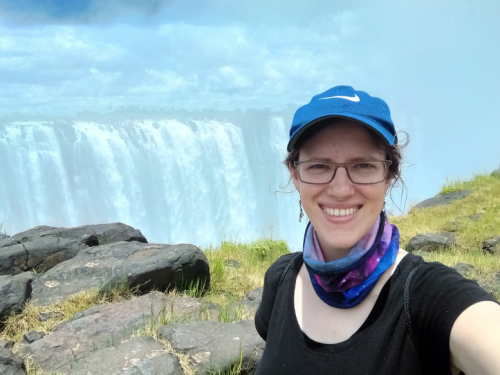
Katharina standing in front of Victoria Falls, Zimbabwe.
Q: If you could go anywhere on vacation, where would you go?
A: New Zealand & Australia and then somewhere in South America so I can say I’ve been to all continents (except Antarctica).
Q: Do you have any pets? If so, what kind and what are their names?
A: While in East Africa my housemate and I found two puppies in the field across the street. The mama was the neighborhood stray so we ended up taking the puppies. Roo and Stoney (named after a Ugandan ginger soda) needed a bath every day for a month to get them clean and bug free.
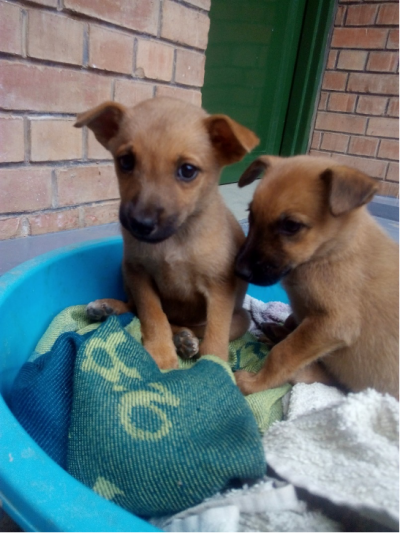

- Andrea Ewing Callicutt
- News
In collaboration with the KLAS Users' Group Program Committee, we're excited to announce the next two upcoming KLAS Users' Programs. In August, there will be a roundtable for staff of libraries for the blind and print disabled and in September Katy will be hosting a webinar for all KLAS Users' who want a preview of the new KLAS WebOPAC. Mark your calendars now for one or both of these events and join us! More details about each are below.
8/25/2022 KLAS LBPD Roundtable: Talking Book Topics
Date: Thursday, August 25
Time: 3:30 PM Eastern / 12:30 PM Pacific
Description: With the recent loss of the physical Large Print Talking Book Topics from our Reader Advisory Tool Box, libraries are crafting new strategies to keep readers informed about new titles being added to the collection. Attend our August roundtable to hear how other libraries are addressing these changes and share your own successes in addressing the changes with TBT.
Hosts:
- Michael Lang, Kansas Talking Books Service
- Maureen Dorosinki, Florida Braille & Talking Book Libraries
- Crystal Grimes, Oregon Talking Book & Braille Library
Recording:
9/22/2022 Keystone Webinar: WebOPAC Revamp
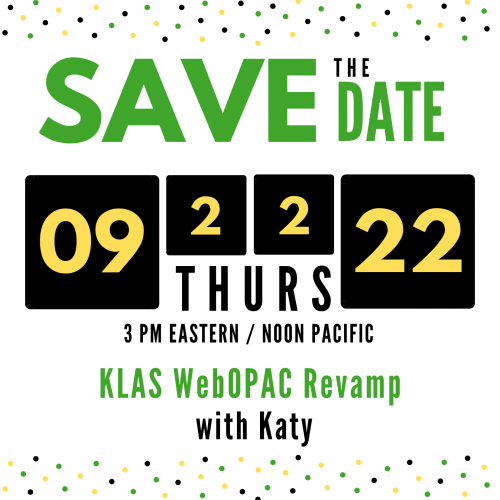 This webinar will be recorded and posted to klasusers.com for later review.
This webinar will be recorded and posted to klasusers.com for later review.
Date: Thursday, September 22
Time: 3:00 PM Eastern / Noon Pacific
Description: You've probably heard the good news about an upcoming revamp of the WebOPAC for LBPH. Ready for more info and a first look at our prototype? Take a look at what we have so far and provide feedback to help shape the future OPAC!
Presenter: Katy Patrick, Keystone Systems
Zoom Link & Audio Dial-in Info:
- Zoom Meeting Link: https://us02web.zoom.us/j/88585822893?pwd=VUFabU1NYTBVcmpNRERxem9EQnd3QT09
- Find your local number to dial-in for audio: https://us02web.zoom.us/u/kdA5mXTjhQ
- Meeting ID: 885 8582 2893
- Passcode: 137231
- Andrea Callicutt
- News
An updated version of the KLAS User Group bylaws was presented to the KLAS Users' Group at the business meeting held on Wednesday, May 4, 2022. The members of the Users' Group then proceeded to vote online to accept the bylaws with all suggested revisions effective July 1, 2022.
- Andrea Ewing Callicutt
- News
Our blog post this week is the latest in our "Stars of Keystone" series. This time we're highlighting our newest Keystone staff member, so let's welcome and learn more about George!
Basic Stats:
Name of Staff Member: George Martell
Year Hired: 2022
Current Job Title: Software Development Specialist
Getting to Know You Q&A:
Q: What are you most excited about / looking forward as a new KLAS developer?
A: Much of my life has been spent serving various communities and trying to develop tools that enable people to do more. I love to pursue the promise of technology where it allows us to do things that we couldn’t do before, do them more efficiently, or do things in new ways that were previously thought impossible. Technology has the power to transform lives, and being able to contribute my small part to that gives me purpose.
Q: What did you do before working for Keystone?
A: IT, Safety, and Security at NC State University. Taught Nuclear Power, Radiological Chemistry, electronics repair and design at a Department of Energy Site. Operated, Maintained, and Repaired Nuclear reactors for 10 year, 5 of which I lived on a submarine.
Q: What are your hobbies outside of work?
A: plants, backpacking, pretty much anything outdoors, building things.
Q: If you could go anywhere on vacation, where would you go?
A: Somewhere I haven’t been before, I love to explore.
Q: Do you have any pets? If so, what kind and what are their names?
A: Turtle, had her since I was in elementary school, her name is Urtle (give me a break on the name, I was in elementary school).
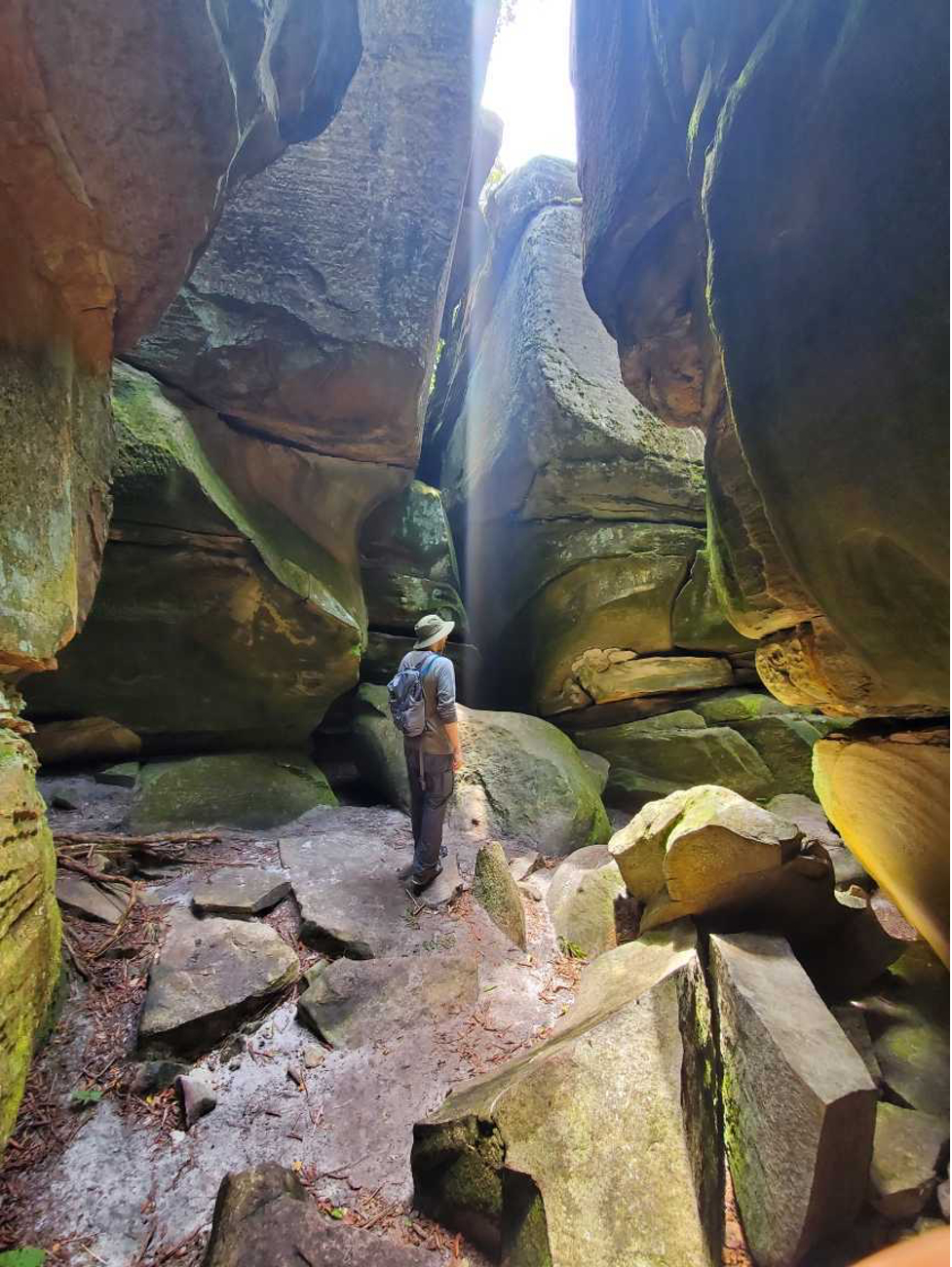
A map of places where George has traveled.
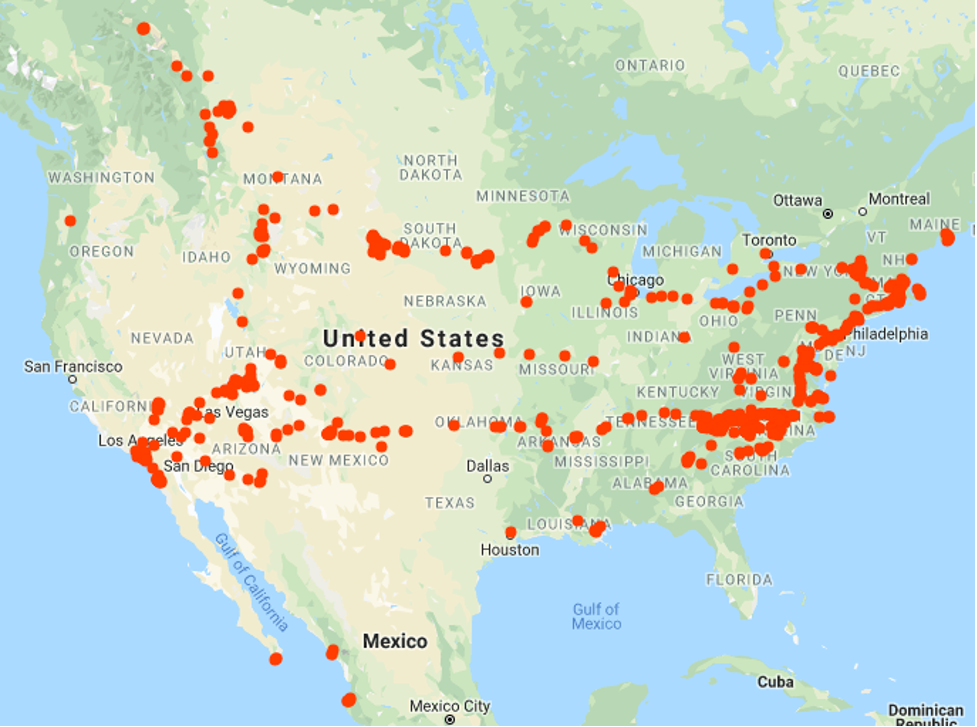
- Andrea Ewing Callicutt
- News
Per the recent KLAS Users' Group Meeting, please meet your candidates for the open Users' Group Vice President position. A link to vote will soon be sent to each KLAS organization / library's designated representative.
KLAS Users' Group Vice President Candidates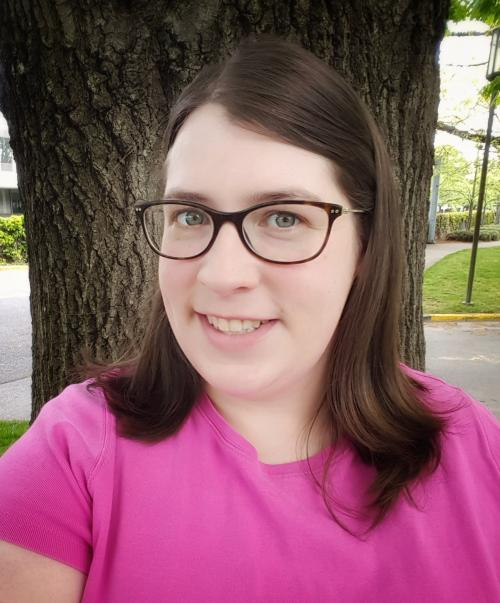
Crystal Grimes, Customer Service Coordinator, Oregon Talking Book and Braille Library
Biography: Crystal Grimes is the Customer Service Coordinator for the Oregon Talking Book and Braille Library at the State Library of Oregon. She holds a Bachelor of Science in Information Systems from Western Oregon University and a Masters in Library Science from Emporia State University. Crystal has been at the Talking Book Library since 2012 where she started as a Circulation Technician and has had her current position since 2018. Her current position at the library is defined by customer service, reader’s advisory, and setting up new patron accounts. Crystal is currently serving on two Keystone committees, the Programming Committee and the KLAS Development Advisory Committee (KDAC). In her spare time Crystal loves to read (fantasy is a favorite but she will read anything) and play video games.
Statement of Goals: I’m very excited to work with Keystone and the User group as Vice-President. A goal that I have is to encourage KLAS users to be active in their own learning and experience using KLAS. I want to promote learning and active participation in the KLAS conferences and on the KLASusers web forum. Since I am on the programming committee, I can also bring forward learning ideas from users and help to bring them into creation. I want to be an active listener to the users because this group has a lot of experience and ingenuity, and it deserves to be shared and recognized.
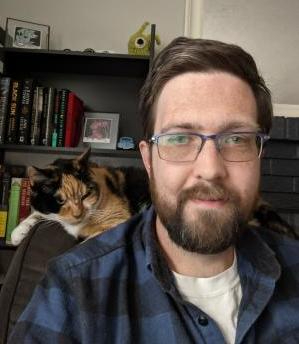 Sam Lundberg, Reader Advisor, New Mexico State Library for the Blind and Print Disabled
Sam Lundberg, Reader Advisor, New Mexico State Library for the Blind and Print Disabled
Biography: I have been in libraries for nearly a decade now. I cut my teeth on the reference desk in Tippecanoe County Indiana in 2012, before moving to the night shift at Purdue's Library of Engineering and Science. In 2018 I began working at the New Mexico Library for the Blind and Print Disabled as a Reader Advisor and never looked back. I have served on the KLAS Development Advisory Committee since 2019, taking over the KDAC presidency in 2021.
Statement of Goals: The users group should be proactive in encouraging absolutely everyone to ask questions, experiment with new ideas, and participate in the greater discussion. We've opened up so many new avenues for participation with remote conferences and online conversations and I want to expand upon that progress.
- Andrea Ewing Callicutt
- News
At the KLAS Users' Group Meeting held at 1:00 PM Eastern Time on Wednesday, May 4 as part of the 2022 KLAS Users' Mini-Conference Michael Lang, KLAS Users' Group President, presented proposed amendments to the KLAS Users' Group Bylaws. Discussion ensued and the below documents reflect the bylaws changes including feedback from the business meeting. For those who could not attend or wish to review the discussion, the PowerPoint and recording of the business meeting is now available in the KLAS Mini Conference Recordings & Presentations article.
Current KLAS Users' Group Bylaws
May 2022 Proposed Bylaws Amendments
Voting
A link will be sent to a designated representative of each KLAS library / organization to vote on these changes. Voting must be conducted within 30 days and a 2/3 majority is required to approve the changes.
2022 KLAS Users' Mini-Conference
Expired- Andrea Ewing Callicutt
- News
As announced in an earlier Keynotes Blog Post, Keystone staff and the KLAS Users' Group Program Committee are teaming up to bring you an online KLAS Users mini-conference the afternoons of May 3-4. Today, we're sharing a bit more info about what we have planned.
Sessions with interest for all KLAS Users will be held on both days, and we hope you can join us for this free online training and networking event!
- Dates: Tuesday, May 3 - Wednesday, May 4, 2022
- Time: 1:00-5:00 PM Eastern / 10:00 AM-2:00 PM Pacific
- Format: All sessions will be held via Zoom with a dial-in for audio option provided. Also, concurrent Birds-of-a-Feather sessions will be held in 3 separate Zoom breakout rooms.
- Access: Zoom links will be emailed to registered attendees approximately a week prior and posted on this page a day or so before the event.
- Session Recording: All Tuesday sessions as well as the KLAS Users' Group business meeting will be recorded. Birds-of-a-Feather sessions will not.
Agenda:
Tuesday, May 3
Tuesday sessions will be Keystone presented and focused on sharing Keystone company and service updates and new KLAS features and functionality for LBPD, IRC, and others.
- Zoom Meeting Link for all Tuesday sessions - https://us02web.zoom.us/j/88138984215?pwd=RGVIdkEzS1IyRzJXSytIVFVVODB3QT09
- Meeting ID: 881 3898 4215
- Passcode: 667394
| Time | Session Title | Presenter |
|---|---|---|
| 1:00-2:15 PM ET | KLAS Updates for Libraries for the Blind & Print Disabled | Katy Patrick, Keystone Systems |
| 2:30-3:30 PM ET | General Keystone Updates | James Burts & Andrea Callicutt, Keystone Systems |
| 3:45-5:00 PM ET | KLAS Updates for Instructional Resource Centers | Katy Patrick, Keystone Systems |
Wednesday, May 4
Wednesday features a KLAS Users' Group Business Meeting followed by user-moderated Birds-of-a-Feather sessions. Birds of a Feather (BoaF) sessions are an opportunity to exchange ideas in a casual, group discussion setting. Topics range from making the most of KLAS features to exploring broader service-related ideas. These sessions are not formal presentations with slides or software demonstrations. Instead, moderators launch the discussion and keep the conversation on topic.
Each of Wednesday's concurrent Birds-of-a-Feather sessions will be accessed via one Zoom link. Once you enter the meeting, there will be 3 breakout rooms you can choose to join (one for each topic).
| Time | Session Type | Session Title | Presenter / Moderator | Zoom Info |
|---|---|---|---|---|
| 1:00-2:15 PM ET | General | KLAS Users' Group Business Meeting | Michael Lang, Kansas Talking Books |
|
| 2:30-3:30 PM ET | Birds-of-a-Feather | 1. APH Integration 2. Circulation 3. KLAS Administrator |
1. Jared Leslie, Arizona Foundation for Blind Children 2. Maureen Dorosinski, Florida Talking Book Libraries 3. Michael Lang, Kansas Talking Books |
|
| 3:45-5:00 PM ET |
Birds-of-a-Feather |
1. IRC Queries & Reports 2. Reader Advisor 3. Tech Services & Equipment |
1. Jared Leslie, Arizona Foundation for Blind Children 2. Sam Lundberg, New Mexico LBPD 3. James Gleason, Perkins Library |
|
Dial-in Audio for ALL sessions:
Registration:
Registration is not required, but it will give us an idea of how many attendees plan to attend. Also, persons who register will receive an email approximately one week before the mini-conference with the agenda, Zoom links, and dial-in for audio numbers.
Introducing the Scribe 2.0
Expired- Katy Patrick
- News
Keystone Systems is pleased to announce an updated version of the Scribe, our duplication on demand appliance.
The Scribe 2.0 merges the current Scribe components into a single unit thus providing the computing and storage of the Scribe Mini along with the duplication slots of the Scribe Tower in one device. It is a smaller package, with the cartridge slots being more tightly packed than the current Scribe Tower and new shelving units on each side providing organization for the mail cards.
The new design makes use of a manufactured computer case, meaning we longer need to manufacture Scribe Tower cases locally which was one of the recent bottlenecks in filling Scribe orders.
The Scribe 2.0 maintains the light strips to provide the status of each duplication slot by indicating whether it is duplicating a cartridge, completed, or has encountered an error. However, the hardware controlling the light strip has been updated to a new component we can control, with the expectation that the lights remain more reliable.
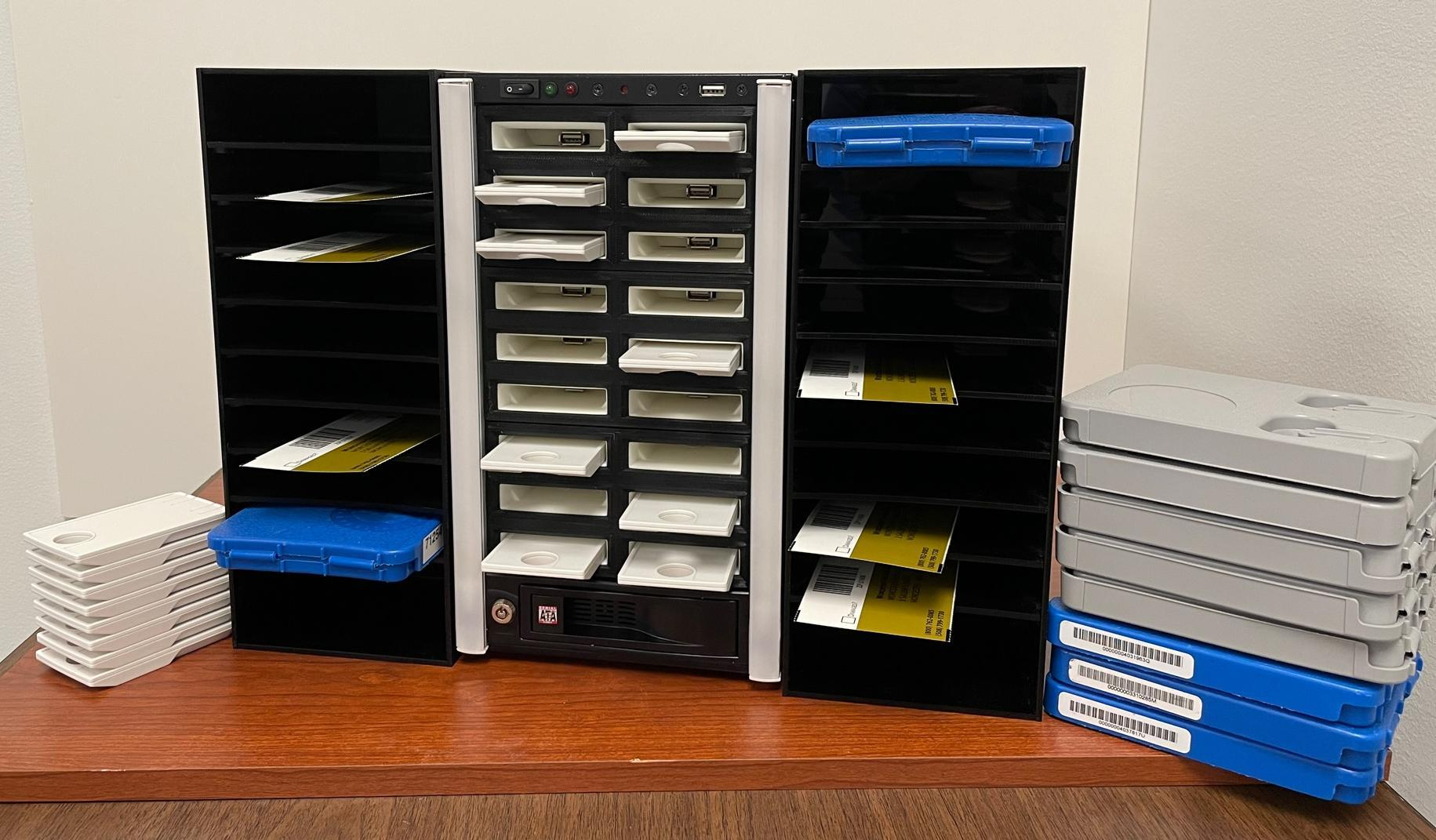
(click on the image for a closer look)
All Scribe Systems (whether a standalone Mini, a Mini plus Tower, or the new Scribe 2.0) have access to the same functions, including the web monitor, regular and walk-in duplication modes, and the upcoming ability to unlock and repurpose white NLS cartridges.
Due to increases in the prices of components, the cost of a Scribe 2.0 is $1,750. Existing orders for Scribes will be fulfilled with Scribe 2.0 systems, and the pricing at the time of order will be honored.
- Andrea Ewing Callicutt
- News
Keystone is excited to announce that we've signed an agreement with the National Library Service for the Blind and Print Disabled (NLS) to allow our Scribe Duplication on Demand system to unlock the white, pre-loaded NLS cartridges for repurposing.
Our developers have already begun working on adding this feature to KLAS and expect the initial release of this new functionality to be in the next month.
We plan for the unlock process to be very simple. When you plug a cartridge in to the Scribe to duplicate onto it, the Scribe will check to see if the cartridge needs to be processed. If the cartridge is one the system hasn't seen before, it will process it, ensure we can unlock it, and then follow the NLS guidelines setting the passphrase to be consistent across the network for all repurposed NLS cartridges.
For any cartridges that can't be processed as part of duplication, there will also be a separate mode which allows staff greater control, ensuring all cartridges can be processed and unlocked.
We know this functionality is something our current and future Scribe libraries have been hoping for, and we're thrilled to now be able to bring it to you! Be on the lookout for a Weekly Wrap-up in the near future which will detail exactly which KLAS release includes the capability for Scribe to unlock ALL NLS cartridges.
Please be sure to let customer support know if you have any questions about the timeline or implementation process.
- Katy Patrick
- News
Did you attend our last webinar on Serials for Duplication, or watch the recording? Our panelists did a great job talking through their approaches and processes, and answering questions from attendees. Since this is such a big topic, with plenty of new complexities thrown in by the transition to Duplication, here’s a little extra follow-up.
To separate by Medium, or not?
In the roundtable, you heard some of our panelists use a separate Medium, such as “LDS,” for locally duplicated serials. Others use the same DB Medium used for books and physical DB serials. We covered some of the reasons in the roundtable, but just to clarify in black and white:
- Both approaches work—choose the one that fits your library’s needs.
- Using a separate Medium requires the patron to have a separate Medium Profile and a separate Service Queue.
- This allows you to set a Cutoff, Max Per Cart, and other settings that apply only to Magazine cartridges.
- This means Duplication Orders only contain books or magazines, never both.
- For Scribe, a separate Medium allows you to set a different leaflet or announcement file to include on Magazine vs book cartridges.
- We are looking into methods for separating Dup Order batches for handling by Medium, but nothing is in place just yet.
If you want to start Duplicating Serials as a separate Medium, several pieces of set-up will be needed. Contact Customer Support to get started.
Receive an Issue to trigger Retention
Some issues have been reported with getting Duplication-only Serials to obey the Retention settings. This is because the settings are attached to the Holding, which is associated with inventory. In other words, it was programmed expecting physical circulation, before we had any inkling of the need to duplicate serials on demand.
Right now, KLAS is not following Serial Retention settings if there isn't at least one Copy of an issue. So the fix is to Receive at least one Copy of each issue, even if you only plan to circulate the issue using Duplication. This allows you to “activate” the settings associated with the Holding, such as Retention.
Subscription Start Date
John Owen shared this tip in the roundtable. To prevent unnecessary Serial Reserves being created (and Assigned if the patron is not yet set up for Duplication), set the Start Date for new serial Subscriptions to tomorrow.
By forward-dating the subscription, you tell KLAS not to run the usual programs designed to get physical inventory assigned and out the door to new subscribers ASAP. Instead, the subscription will quietly become active overnight, overnight, and all new issues will be added to the patron's Service Queue as they are Received and the eDocs created.

We hope these insights are useful as you enter the brave new world of providing serials within a duplication on demand service model. As always, please don't hesitate to contact support with any questions.
- Andrea Ewing Callicutt
- News
The KLAS Users Program Committee and Keystone are excited to share details about our next two online training and networking opportunities. Please let us know if you have any questions about either, or any other training opportunities (such as KLAS Administrator Training).
Keystone-Presented April Webinar
What resources are available to help new users get up-to-speed on KLAS, and what is still needed? Come find out what's on offer and provide your suggestions and requests for future offerings at our April Keystone-presented webinar.
- Date: Thursday, April 7, 2022
- Time: 3:00 PM Eastern / Noon Pacific
As usual, the Zoom link and dial-in number for audio will be provided in the KLASusers Knowledge Base approximately one week prior.
May KLAS Users' Online Mini-Conference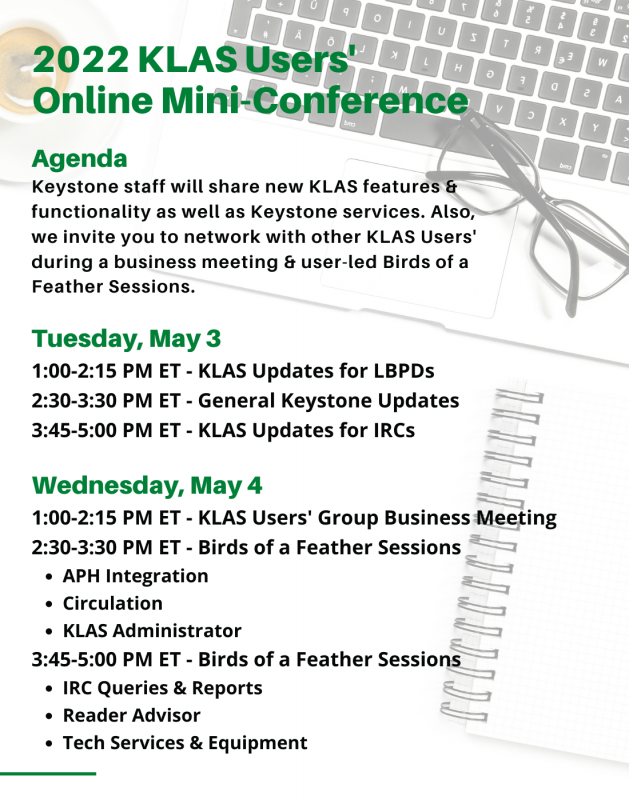
The KLAS Users' Group Program Committee is excited to announce the dates and planned schedule for the 2022 KLAS Users Online Mini-Conference to be held May 3-4. Tuesday's sessions will be presented by Keystone staff and Wednesday's will be presented by various KLAS Users.
We aimed to include topics that will appeal to all aspects of the KLAS Users' Community, so be sure to mark your calendar now and don't miss this fantastic online training and networking opportunity!
- Dates: Tuesday, May 3 - Wednesday, May 4, 2022
- Time: 1:00-5:00 PM Eastern / 10:00 AM-2:00 PM Pacific
Mini-Conference Agenda:
Keystone staff will share new KLAS features & functionality as well as Keystone services. Also, we invite you to network with other KLAS Users' during a business meeting & user-led Birds of a Feather sessions.
Tuesday, May 3
1:00-2:15 PM ET - KLAS Updates for LBPDs
2:30-3:30 PM ET - General Keystone Updates
3:45-5:00 PM ET - KLAS Updates for IRCs
Wednesday, May 4
1:00-2:15 PM ET - KLAS Users' Group Business Meeting
2:30-3:30 PM ET - Birds of a Feather Sessions
- APH Integration
- Circulation
- KLAS Administrator
3:45-5:00 PM ET - Birds of a Feather Sessions
- IRC Queries & Reports
- Reader Advisor
- Tech Services & Equipment
Registration:
Registration is not required, but it will give us an idea of how many attendees plan to attend. Also, persons who register will receive an email approximately one week before the mini-conference with all the agenda, Zoom links, and dial-in for audio numbers.
Getting Serious about Series
Expired- Katy Patrick
- News
With KLAS release 7.7.65 in the final stages of testing before going out to Early Release, let’s take a look at the series improvements we’ve been working on.
Service Order Preference
When you add or update a Series Preference after getting this update, you’ll have a new field: Service Order.
This defaults to Sequence, which will send series book out according to the cataloged Sequence as KLAS has always done it, plus all the new updates below. However, you will also have the option of switching the preference to PubDate—allowing the patron to receive the series in order by Publication Date!

Some series (especially some of those long-running science fiction and fantasy series) have a contested read order. We hope this option will allow your patrons more flexibility in how they receive their series, without adding extra work for your cataloger.
Multiple Ordered Series
While the Title-Bib page in the KLAS Catalog module always allowed multiple Series to be selected, it only supported one Series Sequence. With this update, however, you will finally be able to apply a unique Series Sequence to every Series on a title!
Since the Series field is only long enough to display one series at a time, the Heading Select button will be flagged red as a heads-up if multiple series are selected. Screen reader users will be able to hear all applied series listed in the field, as they don’t have to contend with the limited display area. The Series will be listed in order from the lowest sequence to the highest.
The SerSeq field will display only the lowest sequence for that title. All of the sequences can be viewed series by series on the Select Headings screen.

Once a Series Sequence is set for each series a title is part of, any of those series will send that title in the correct order. If a patron has a preference for both series attached to a title, they will get the title from both series, as long as it is not currently a HasNow (including being already in the Service Queue or in a pending Duplication Order). This will allow the patron to read the book again in context of the second series, or safely skip it the first time it's received if they want to avoid spoilers for the other series, knowing they’ll get it again when they catch up in the other series. If they still have the title from the first series, the second series simply skips it and continues with the next title in their preferred service order.
Multiple Sequences for one Series
In addition to being able to set a unique sequence for each series, you can also enter a list of sequences for one series. This allows KLAS to intelligently handle compilation titles, where NLS included multiple books on one cartridge / in one recording.
For a title with books 1-3, you can tell KLAS the title includes sequences 1,2,3. If the patron already had book 1, and books 2 and 3 are also available as single-book titles, KLAS will send the singles instead of repeating book 1. If any sequence is only available in the compilation, KLAS sends the compilation instead of any single-book titles, even if a patron already had one or more books on the compilation. And if all titles are available both ways, and the patron hasn’t had anything on the compilation yet, KLAS will send whichever ‘set’ of books is newest, as determined by the Pub Date, with the date added to the catalog as a tie-breaker.
In short: KLAS will send every book in the series, as identified by SerSeq, with as few duplications as possible. When it has an otherwise equal choice, it will aim for a newer recording.

You can also have compilations with a sequence list with gaps in it, usually for a collection of novellas that go in-between various "main" series books. The SerSeq, used to determine where in sequence a title should be sent, is still controlled separately from the list. This allows you to control whether this type of collection should be sent as the first sequence (0.5 in the above example, allowing the patron to read the prequel before book 1), the last sequence (17.5 in the example, ensuring the patron won’t get any spoilers for books they haven’t gotten to yet), or after all other titles in the series (SerSeq 99 will usually be safe).
Of course, for patrons with a “PubDate” service order for their Series preference, the SerSeq will be ignored in favor of the Pub Date; however, the Seq List can be used to identify unique vs duplicate series books (as in, has the patron already had some of the books in this compilation? Are all of them available another way?).
Some nitty-gritty extra detail: The SerSeq must be included in the list (so if forcing the above example to the end of the series, the list would become 0.5,2.5,9.5,13.5,99.0). Remember these sequences are used to identify duplicate books in the series, so if you have a stand-alone 13.5 and a compilation 13.5, KLAS will try to only send one version. However, if you have two such compilations, with at least one SerSeq in each list only available in that compilation, they will both be sent even if they were both seq 99, to ensure all unique sequences are sent.
Select Headings
Both the SerSeq and Sequence List are set on the Select Headings screen, which has also gotten a couple “bonus” upgrades while we were adding the new fields.
The change list includes:
- Search field is now a “matches” filter, not a “begins” search
- Number of associated Titles and Patrons now included in both halves of the screen
- “Relator” field added for Author and Narrator headings
- SerSeq and Sequence List fields added for Series headings
This means that, instead of typing in letters to skip to the part of the list that begins with those letters, you can now filter the left-hand list using a “matches” search against any part of the series. Not sure whch author a multi-authored series is listed under? No problem—just type in one or more words from the series description, and hit Tab to see only the results.
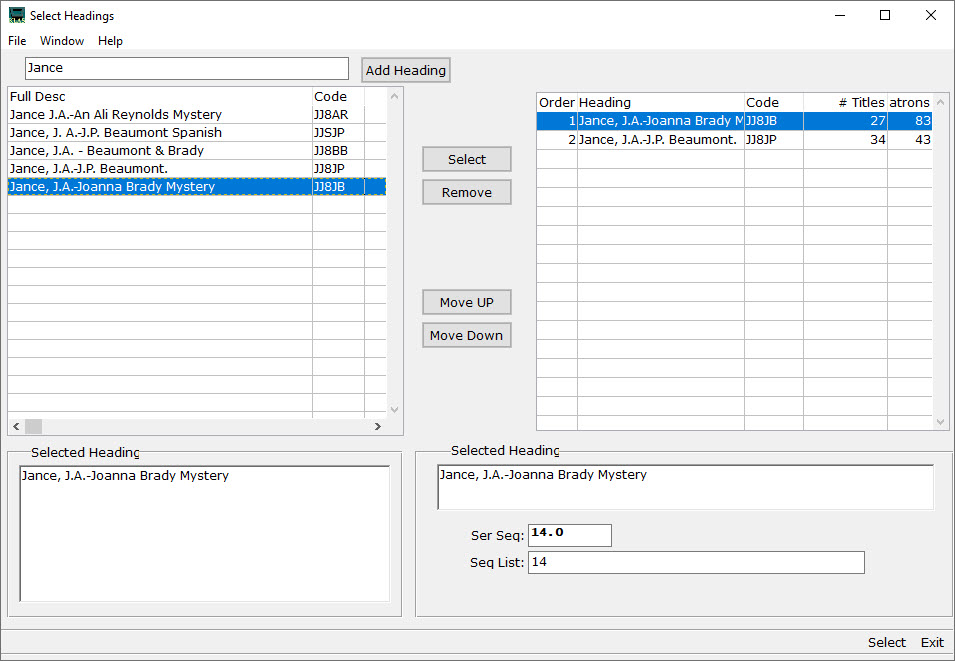
The search will include the author, series description, and fuller form fields. So, if an alternate series title is entered in the main heading’s MARC data as a fuller form, you can then filter for the series using either title. If a heading has a fuller form, it will display along with the full description in the “Selected Heading” field in both column’s detail viewer.
Note: the search words will be treated as a complete string, not keywords. “Wild West” will match “Wild, Wild West,” and “Untamed Wild West,” but not “Wild, Wooly West” or “West, Wild and Wilder.”
To return to the full list, delete everything from the search field and press Tab again.
Finally, about those “relator” terms: in brief, those allow for accurate MARC tags for Editors, Translators, and the like. They can be set for any selected Author or Narrator heading in the same part of the Select Headings screen where SerSeq and Sequence List are set for series. If more information on Relators is needed and wanted—let me know and I’ll get it out to you!
Next Steps
This is all wonderful, of course (or so we hope), but we know updating the whole back-catalog can be a daunting task. How do you go about getting all of this set up for all of the series in the collection?
We’d love to do it all automatically... unfortunately, that isn’t feasible with the variety of approaches libraries have taken to their series cataloging, and the need to preserve any other cataloging changes made to titles vs their original MARC data from NLS.
We have, however, done our best to make sure as much data as possible can be brought in from newly-imported MARC data, and to make sure series MARC data exports as well as possible from KLAS. To take advantage of this, you may need your Filter set-up adjusted.
Your best bet will be (once you get the update to use Headings Maintenance to sort your series by # Patrons. That will identify your most popular series, and those will be the ones most worth reviewing to correct/update the series information on each title.
Then, when you next import MARC records take a look at how the series data comes in, and contact us to discuss any changes that are needed to your filters to ensure you get as much automatically as possible.
Conclusion
This is a big, complicated update on every front: the work needed to make it happen, the patron service implications, and even the task of explaining all of those implications. We’ve done our best to ensure that these changes result in better service, with the least work needed on your part, with as much room for flexibility and control as possible.
Big, big thanks to the KLAS Development Advisory Committee (KDAC) for help steering these changes and informing service decisions (such as when to send a compilation vs the same set as single-title recordings), and to Brian White, who did the bulk of the actual programming as his final project for Keystone.
We will continue to work with you to ease the cataloging transition, and to answer questions either now or as they arise.
We hope this update is a big improvement for you and your patrons!
Farewell Address
Expired- Katy Patrick
- News
“Life is a journey, not a destination.”
Ralph Waldo Emerson
Late last year, I reached the age where I became eligible for full Social Security retirement benefits. I decided at that point that I wanted to be able to spend time doing fun things with the family and travel during a time when my health was not a problem. My wife, Aimée, retired a couple of years ago, and she has been patiently waiting for me to join her. We have seen a goodly number of people who have worked longer years, and then had mobility or other health issues facing them by the time they retired. As such, during these last few weeks, I have been drawing to a close my time at Keystone.
When my career at Keystone started in August of 2004, I was unfamiliar with the programming language used here. I’ve always enjoyed learning new things, finding it fun to figure out how programming languages work. This set the stage for an enjoyable, new challenge.
The NLS Books on Tape program was not, however, unfamiliar territory. My father, Joe White, had retinitis pigmentosa, and his vision had regressed, several years prior to his passing in 2002, to the point where he was eligible for the program. He was a customer of the Louisiana State Library for the Blind and Physically Handicapped, and I had seen the tapes, floppy discs, green boxes, and the player when our family visited him and my mother at the house where I grew up. He often talked about how much he enjoyed listening to the books and magazines. He and my mother would comb through the TBT listings when they were sent, to pick out those titles he would be interested in hearing.
I’m a back-room kind of guy. I talk in geek-speak, and usually need real-people interpreters in order to effectively interact with customers. For that reason, you may not know me, even though I’ve been here a while. You may be more familiar with some of my favorite projects, in which I have played a major role, that are still around – Nightly (both the original, now termed “physical”, version and the more recent service queue fill version), Excel export, some accessibility improvements with browses and Supertabs, the Service Queue tab in the Patron module, and the PIMMS interface.
I won’t delve into the geekiness of all of the fun I had working on all of those (as well as others), but I would like to let you know that working on the nightly programs was a very personally rewarding experience. Though my Dad was no longer around, I still felt a personal connection to serving content to the patrons in the best way I could, because I approached the project as if my Dad were here to receive the results. (Louisiana is a KLAS customer; so, if he were still a patron, that would have been the case. How rewarding that would have been!)
There is one other project left for the end of this list. Along the way in my journey here, I have worked and reworked, and reworked again the series processing in KLAS. Aspects of series processing have gotten very complex over the years. In the latest KLAS release (7.7.65, currently in testing) is my last big project – taking into account when serving a patron a series involves a single title that appears in multiple series, or a single KLAS title that houses a compilation of multiple entries in a single series. It has been a fun challenge to end my time here. My sincere hope is that these updates serve you and the patrons well.
I have enjoyed working with the management and staff at Keystone. They have helped me grow over my time here, both technically and professionally. I have welcomed the times I have gotten to meet with you, the customers. It is both important and interesting to understand your work and how we software developers can best serve you. I appreciate your feedback, positive or negative, as it has always helped improve our process.
Thank you for all you do to serve this sector of the public. Your work is truly a valuable public service. I am genuinely honored to have played even a small part in it.
Peace and Good Fortune to you all!
Brian White
- Andrea Ewing Callicutt
- News
From the desk of James Burts, CEO, Keystone Systems:
Oh, for the good old days of just writing software…..(aka logistics and parts availability for the KLAS Scribe)
*wistful sigh*
It’s times like these I look back longingly when Keystone only wrote software. Like many other companies, supply chain issues (especially motherboard availability) have plagued us recently making the production of Scribes and Scribe mini frustratingly slower than desired.
Months ago, we had a lengthy period where we had problems getting our Scribe tower parts produced, because the design file was corrupted. We got that resolved, and thought we were into clear sailing. Unfortunately, it feels like the world conspired against us, and we are now fighting parts availability issues we don’t have any control over.
The manufacturer of the cases we use for the Scribe Mini shutdown their production facility to re-tool and introduce some new models—one of which we are quite interested in. We stopped being able to receive any of those cases in early December, and now expect to get a shipment in the next week or two.
The motherboards we have to use in the Scribe have become extremely difficult to get our hands on. We have been waiting for several weeks for our most current order, and expect it will take perhaps another month to finally receive them.
The company that made the system we use to control the LED light strips went out of business due to slumping sales in the pandemic. We are working to create a replacement for this component with a much more commonly available Raspberry Pi microcontroller, but we had to write the software to have the Raspberry Pi do the things we need.
The power supplies we use in the Scribe Mini have also been very difficult to purchase.
Things have been improving lately. We expect to receive a shipment of Scribe Mini cases in the next week or so. Our Raspberry Pi version of the light controller looks to be more reliable, and development should be wrapped up on it in the next week or so. We plan to installed it at a beta site or two shortly.
Our biggest issue remains motherboards. We have a number of orders outstanding, and our best hope for anything beyond just one motherboard is looking to be at least a month away.
From my current perspective, I’m really missing the good old days that didn’t include shipping and logistics headaches as we strive to provide a quality product for you. However, we’ll push through this and look forward to getting more Scribes built and put to work for your libraries and patrons as soon as possible.
Upcoming Training & Networking
Expired- Katy Patrick
- News
Hello, KLASusers! Although we are in an off-year between full KLAS Users’ Conferences, we still want provide opportunities for you to keep up-to-date on KLAS New Features, provide feedback and development requests, and network with each other. With that in mind, just like our last non-conference year, we are working with the Programming Committee to facilitate monthly webinars and will be hosting a “bite-sized” mini-conference this summer.
This began with last month’s Keystone-presented webinar on Cataloging for Duplication, and will continue following a pattern of one LBPD user-presented, one IRC user-presented, and one Keystone-presented webinar per quarter.
APH Roundtable Webinar
For this quarter’s IRC webinar, we have a Roundtable on the APH Census, with discussion on how you go about the census process and how KLAS can better support that work. That roundtable is scheduled for Tuesday, February 22nd, at 3pm Eastern Time, and will be moderated by Jared Leslie, Director of Media and Development at the Foundation for Blind Children in AZ, along with Sally Shreck, Specialized Media Coordinator at the Maryland School for the Blind IRC, and Allen Huang, Director of Accessible Instructional Materials and Outreach Services, and Kathy Segers, Educational Consultant, at Tennessee Resource Center for the Visually Impaired. We hope you’ll be able to join in, learn from their approaches, and provide your own perspective!
Connection details will be posted about one week before the webinar.
Save the Date: KLAS Mini-Conference
Like 2020’s mini-conference, we plan to take an afternoon in early May to share Keystone Updates and KLAS New Features. This year, we are also adding a second afternoon, which will include a Users’ Group Meeting to review and vote on a bylaws change, and a few user-led Birds-of-a-Feather sessions.
We plan to stagger IRC, General, and LBPD content as much as possible to ensure you get as much out of this as possible with the least time investment. While the exact schedule is still to be determined, we currently have the week of May 9th (the week before the NLS Conference) earmarked for our two-day, bite-sized, online mini-con.
Admin Training
While broader webinars and networking events are great, sometimes you need a more specific, hands-on, deep dive into KLAS and how to make it work best for your specific situation.
A fantastic way to do that is to join us for Administrator’s Training!
This year’s dates for Admins at LBPD libraries are:
- June 6-9, 2022
- September 12-15, 2022
We want to host a session for IRC Admins as well, but we need you to help us set the dates! If you can commit to a session, please let us know so we can work with you to set up dates.
Our Online Administrator's Training article has more info about training structure, pricing, and a link to register. Because of the significant time investment needed from Keystone staff to host Admin Training, we will need at least two confirmed attendees for any session to proceed.
Online Administrator's Training
Expired- Katy Patrick
- News
For many years, Keystone offered regular Administrator’s Training sessions at our office in Raleigh. Not only did that allow us to give admins in-depth training on their own systems, but it also gave them the opportunity to get to know us and network with a few of their peers as they learned together.
However, travel costs are a barrier to some, and others are banned from business travel to North Carolina for political reasons. Then on top of that, we have a pandemic situation. Even Keystone staff isn’t going into the office right now, and we certainly aren't going to ask you to do so. The answer was clear...as much as we loved having you in person, it was time to offer admin training virtually.
We want to make sure attendees get just as much benefit from the online version as they did from attending in person. That means the online version needs to have just as hands-on, personalized, and interactive an approach as the in-person version did, including opportunities for discussion with the other attendees and introduction to several Keystone staff members.
Training Structure & Content
We took this opportunity to revamp and re-evaluate the structure of the training. Because the in-person version required attendees to stay here in Raleigh, it was kept to two (very busy, intense, somewhat demanding) days. To make it a little easier to absorb all of the information without eating too much into your schedules, we spread out the online version to four half-days running from 1:00-4:30 PM Eastern time each day. The lesson plan itself has been updated from a progressive tour of the admin menu to a more module and task-oriented approach.
Finally, to help attendees orient themselves to each topic and come prepared to discuss their own settings and needs, we developed pre-class worksheets for each session. These worksheets are not checked or graded, it’s fine if attendees don’t have time to get through them all, but they will help ensure you get the most out of the training.
For more information about what is covered, please see the Administrator’s Training – What to Expect article.
Upcoming Sessions
2024 Library for the Blind and Print Disabled KLAS Administrator Training
- Monday, March 25 - Thursday, March 28
- Registration Deadline = May 16
- Monday, September 9 - Thursday, September 12
- Registration Deadline = August 30
2024 Instructional Resource Center KLAS Administrator Training
- TBD by participants after individuals from at least 2 organizations commit to attending a session
Prerequisites for attendance:
- Attendee must have a KLAS Administrator role in their local system
- Attendee has authority to change records and policies for their KLAS system
Training Cost
The training still costs $600 per attendee, which covers the staff time needed to prepare for and run the training session. It comes with an Administrator’s Reference manual, which will be mailed to you (or provided electronically if that’s more accessible for you), the pre-class worksheets, and recordings of each session.
We hope this will allow more of you than ever before to benefit from admin training, as well as letting us continue to offer it safely. Be sure to let us know if you’re interested in joining in!
Registration Form
To register for an upcoming session or express interest in another date, please fill out the following form:
If you have any trouble accessing the form or if you have questions, please let us know! We hope to see you soon.



